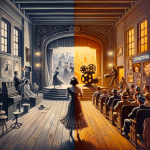Now Reading: A Journey Through the Life of Elliot Lurie
-
01
A Journey Through the Life of Elliot Lurie
A Journey Through the Life of Elliot Lurie

A Journey Through the Life of Elliot Lurie
Welcome to an exploration of the life and career of Elliot Lurie, a remarkable musician known for his influential role in the iconic band Looking Glass. This blog will delve into his early beginnings, musical journey, and the indelible mark he left in the world of music.
The Early Years
Elliot Lurie was born and raised in Brooklyn, New York. From a young age, Lurie showed a keen interest in music, heavily influenced by the rich cultural landscape of his hometown. Influences from various genres filled his early years, paving the way for his future in music.
Musical Beginnings
During his teenage years, Lurie began experimenting with different instruments, focusing primarily on the guitar. His passion for music led him to form several bands, which served as a training ground for his songwriting and performance skills. This period was crucial in shaping his musical identity.
Looking Glass: Rise to Fame
In 1969, Lurie became the lead guitarist, songwriter, and often the lead vocalist for Looking Glass. The band quickly gained popularity, producing hits that became staples of classic rock radio.
Iconic Hits
Looking Glass is perhaps best known for their 1972 hit single “Brandy (You’re a Fine Girl)”. The song showcases Lurie’s songwriting talents, narrating a compelling story that resonated with a wide audience. Here are some key points about their success:
- Chart Performance: The song reached No. 1 on the Billboard Hot 100 chart.
- Legacy: “Brandy” remains a cultural touchstone, featured in numerous films and commercials.
- Collaborations: Lurie worked with other talented musicians in the band to produce memorable tracks.
He wrote and sang lead on their 1972 #1 hit single “Brandy (You’re a Fine Girl)” and their 1973 top-forty single “Jimmy Loves Mary-Anne”.
Later Years and Legacy
After Looking Glass disbanded in 1974, Lurie continued to work in the music industry, producing and writing songs for various artists. His influence extended beyond the band, with many citing him as an inspiration.
After leaving the band in the mid-1970s, Lurie released a self-titled album and a single, “Disco (Where You Gonna Go)”, both on Epic Records. Neither reached the Billboard Top 100. He later signed with Arista Records, and also worked writing songs for Chappell Music and Screen Gems Music.
Contributions Beyond the Band
Throughout his career, Lurie showcased versatility by expanding into other genres and exploring different musical styles. Some notable contributions include:
- Songwriting for various artists in the 1980s and 1990s.
- Participating in collaborations that blended rock with other musical elements.
-
Continually engaging with fans through live performances and new music releases.
In the 1980s, Lurie wrote and produced music for private business use. He moved to LaLaLand in 1984, and in 1985, became head of the music department at 20th Century Fox. That year, he produced the soundtrack album for the John Travolta and Jamie Lee Curtis film Perfect. Since then he has worked as music supervisor on numerous mainstream films, including Alien 3 (1992), A Night at the Roxbury (1998), Riding in Cars with Boys (2001), I Spy (2002) and Spanglish (2004). He is also known for his work on Real Genius (1985), Charlie’s Angels (2000)
Reflecting on His Impact
Elliot Lurie remains an influential figure in the music industry. His contributions as a musician, songwriter, and performer continue to inspire new generations of artists.
In conclusion, Elliot Lurie’s journey from Brooklyn to the charts exemplifies the power of music in storytelling. His ability to connect with audiences through heartfelt lyrics and melodies ensures that his legacy will endure for years to come.
Some works include
Flight 29 Down (TV Series) (composer – 19 episodes, 2005 – 2007) (music supervisor – 18 episodes, 2005 – 2007)
The 4400 (TV Series) (music supervisor – 41 episodes) 2004-2007
Lizzie McGuire (TV Series) (music supervisor – 61 episodes) 2001-2004
Nash Bridges (TV Series) (music supervisor – 19 episodes, 2000 – 2001
Clueless (TV Series) (music supervisor – 61 episodes) 1996-1999
1998 Urban Legend (music supervisor)
1996 Dear God (music supervisor)
1996 Larger Than Life (music supervisor)
1995 Let It Be Me (composers coordinator)
1995 Rumble in the Bronx (music supervisor – as Elliott Lurie)
1992 Alien³ (music supervisor – uncredited)
1990 The Adventures of Ford Fairlane (music supervisor)
1986 Jumpin’ Jack Flash (music supervisor)
1985 American Flyers (music co-producer – as Elliott Lurie)
1985 Perfect (associate music supervisor)
1985 The Sure Thing (music coordinator)
Final Thoughts
As music enthusiasts, it is vital to appreciate the talents of individuals like Elliot Lurie, who have helped shape the soundscape of their time. Whether you are a lifelong fan of Looking Glass or discovering Lurie’s work for the first time, his music undoubtedly provides a rich tapestry of melodies and stories worth celebrating.
Stay Informed With the Latest & Most Important News
Previous Post
Next Post
-
 01Famous Writers from Brooklyn, New York
01Famous Writers from Brooklyn, New York -
 02A Comprehensive Look at Famous Novelists from Brooklyn, New York
02A Comprehensive Look at Famous Novelists from Brooklyn, New York -
 03The Impactful Journey of Donald Joel Aronow: A Boat Design Pioneer
03The Impactful Journey of Donald Joel Aronow: A Boat Design Pioneer -
 04A Scenic Journey: The Staten Island Ferry from Brooklyn to Manhattan
04A Scenic Journey: The Staten Island Ferry from Brooklyn to Manhattan -
 05Famous Sports Stars from Brooklyn, New York
05Famous Sports Stars from Brooklyn, New York -
 06A Look Back at the 1977 Brooklyn Blackout: Causes and Impacts
06A Look Back at the 1977 Brooklyn Blackout: Causes and Impacts -
 07A Comprehensive Look at Barry Manilow’s Brooklyn Roots
07A Comprehensive Look at Barry Manilow’s Brooklyn Roots

































